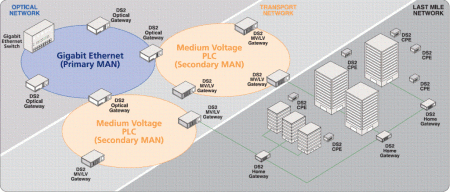Linux devices manage broadband powerline network
Nov 13, 2007 — by Eric Brown — from the LinuxDevices Archive — 1 viewsMini-ITX systems running Linux will soon enable residents of rural Michigan to access the Internet over their electrical power lines at broadband speeds. The systems are also enabling the utility provider there to read meters, monitor environmental factors, and diagnose outages remotely.
The systems were built by Utility.net, a “broadband-over-powerline” (BPL) networking company based in Los Angeles. They run a software component supplied by Dynamic Consulting International (DCI) of Seville, Spain. Adapted from DCI's Unix-based BPL management software, the “nano-agent” software acts as an intermediate communications layer, coordinating activity between the BPL software and the devices with the help of a high-level event-bus architecture.

Utility.net powerline config
(Click to enlarge)
Most of the over 200 appliances in the deployment run CentOS Linux (a freely available Linux OS built from Red Hat Enterprise Linux sources), and also handle other computing chores. However, in substations without existing CentOS servers, DCI says it provided Via Epia-based mini-ITX systems running the nano-agent application under Debian 4.x. DCI says Linux is faster and more affordable than its traditional Unix-based BPL system.
The Utility.net service offers rural residents a choice of three “symmetrical” rate plans offering identical up- and down-stream speeds of 768Mbps, 1.5Mbps, or 3Mbps. The system will roll out initially to about 10,000 customers of the Consumers Energy power network in and around the city of Grand Ledge, west of Michigan's capital, Lansing, according to Utility.net.
After the deployment is completed in early 2008, Utility.net plans to follow up with additional deployments among Consumers Energy's 1.8 million Michigan customers. Utility.net plans to use a similar Linux-based system in all of its future U.S. BPL deployments.
This article was originally published on LinuxDevices.com and has been donated to the open source community by QuinStreet Inc. Please visit LinuxToday.com for up-to-date news and articles about Linux and open source.